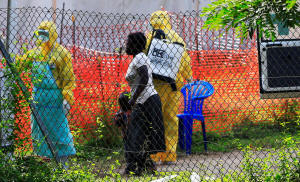Serum Institute to produce Ebola vaccine for use in Uganda outbreak
 Send a link to a friend
Send a link to a friend
 [October 17, 2022]
By Aaron Ross [October 17, 2022]
By Aaron Ross
(Reuters) - The Serum Institute of India
plans to manufacture 20,000 to 30,000 doses of an experimental Ebola
vaccine by the end of November for use in trials against an outbreak in
Uganda, its developers and a company source said.
The response to Uganda's outbreak has been blunted by the absence of a
proven vaccine against the Sudan strain of the virus.
There have been 54 confirmed cases and 19 deaths since last month and
the first case in the capital, Kampala, was recorded last week. But
health authorities believe the actual numbers could be higher.
Vaccines against the more common Zaire strain of Ebola have proven
highly effective during recent outbreaks in neighbouring Democratic
Republic of Congo.
Oxford University's Jenner Institute, which developed a COVID-19 vaccine
with AstraZeneca, has an Ebola vaccine that has been shown to induce an
immune response to both the Sudan and Zaire strains in Phase 1 trials.
Its developers said it could be deployed in Uganda as part of a clinical
trial once the authorities there gave regulatory approval.

"We are working very closely with Serum Institute to rapidly scale up
the manufacture of this vaccine," said Teresa Lambe, the chief
scientific adviser on Ebola at the Jenner Institute.
"We are hoping to have a large number of doses, approximately 20,000 to
30,000 or more by mid-to-end of November," she told Reuters.
A source at the Serum Institute, the world's biggest vaccine maker and
part of a conglomerate run by Indian billionaire Cyrus Poonawalla,
confirmed this information. The source said the Ebola vaccine doses
would be supplied free of cost.
'PLAYING CATCH UP'
Uganda's Information Minister Chris Baryomunsi said in an interview on
Saturday that he did not have any information on a vaccine rollout but
that the outbreak was under control.
[to top of second column]
|

A woman and her child arrive for ebola
related investigation at the health facility at the Bwera general
hospital near the border with the Democratic Republic of Congo in
Bwera, Uganda, June 14, 2019. REUTERS/James Akena/File Photo
 President Yoweri Museveni said the
same day that the government would implement an overnight curfew and
restrict movement into and out of two districts in central Uganda
affected by Ebola for 21 days.
World Health Organization (WHO) chief Tedros Adhanom Ghebreyesus
said last week that clinical trials of two vaccines could begin in
the coming weeks pending Ugandan government approvals, without
naming the vaccines.
There are at least six vaccines in development for the Sudan strain,
including three with Phase 1 data, according to WHO.
The Oxford researchers voiced frustration that their vaccine was not
ready to be rolled out when the outbreak hit, saying governments
around the world had not made investing in vaccines enough of a
priority in the wake of the COVID-19 pandemic.
The vaccine has been in development for several years but its
progress through clinical trials has been slowed by funding
shortfalls, they said.
"With better investment the world could easily have ready-made
vaccines sitting in vials for this and a number of other diseases,"
said Sandy Douglas, an investigator at the Jenner Institute.
"We're spending a couple of months now playing catch up on work that
could have been done ahead of time."
(Additional reporting by Elias Biryabarema in Kampala; Editing by
Andrew Cawthorne)
[© 2022 Thomson Reuters. All rights
reserved.] This material may not be published,
broadcast, rewritten or redistributed.
Thompson Reuters is solely responsible for this content.
 |